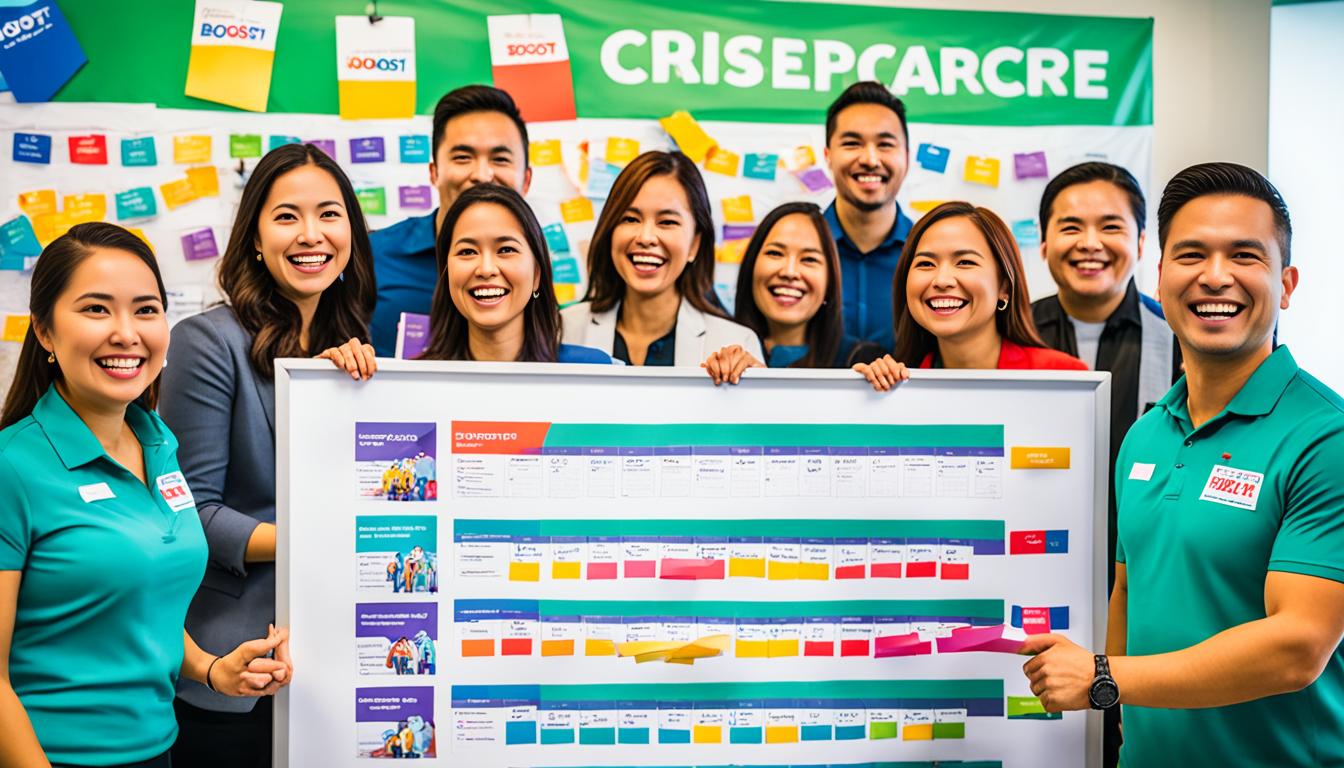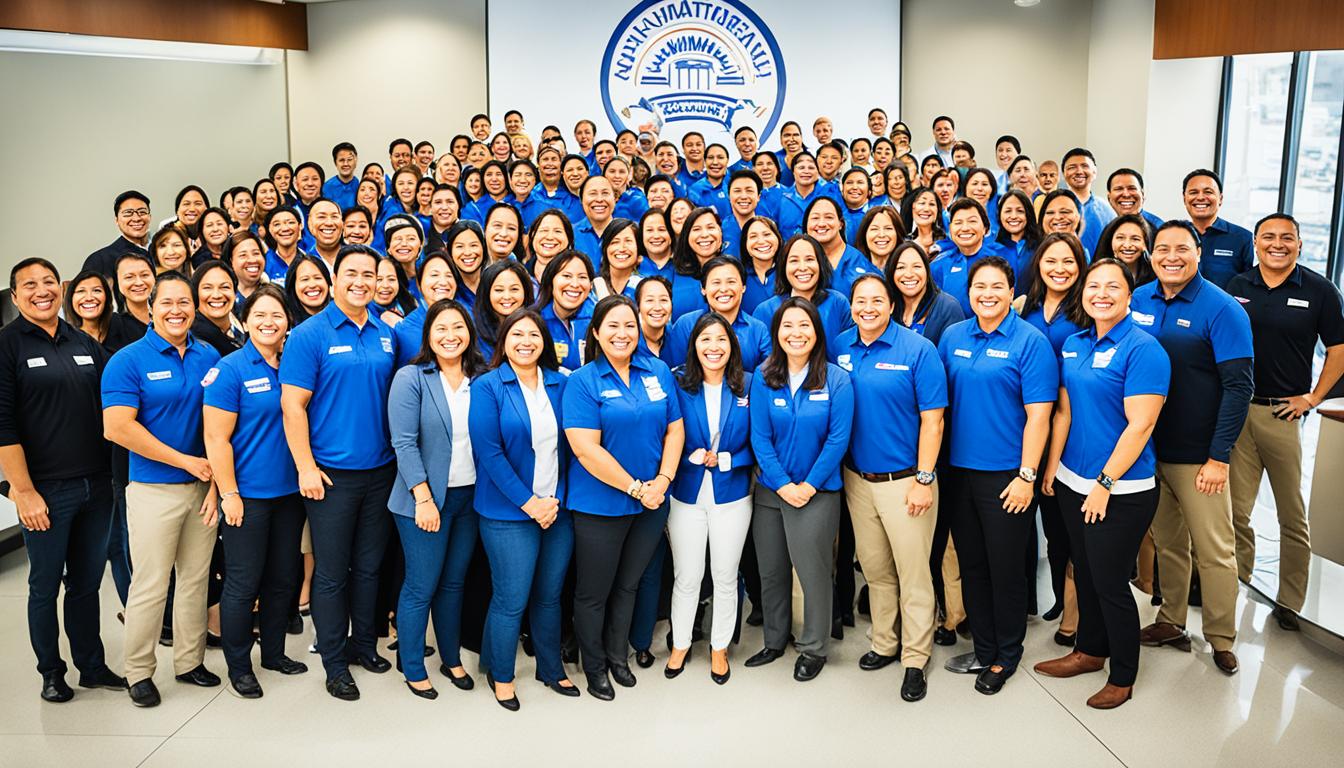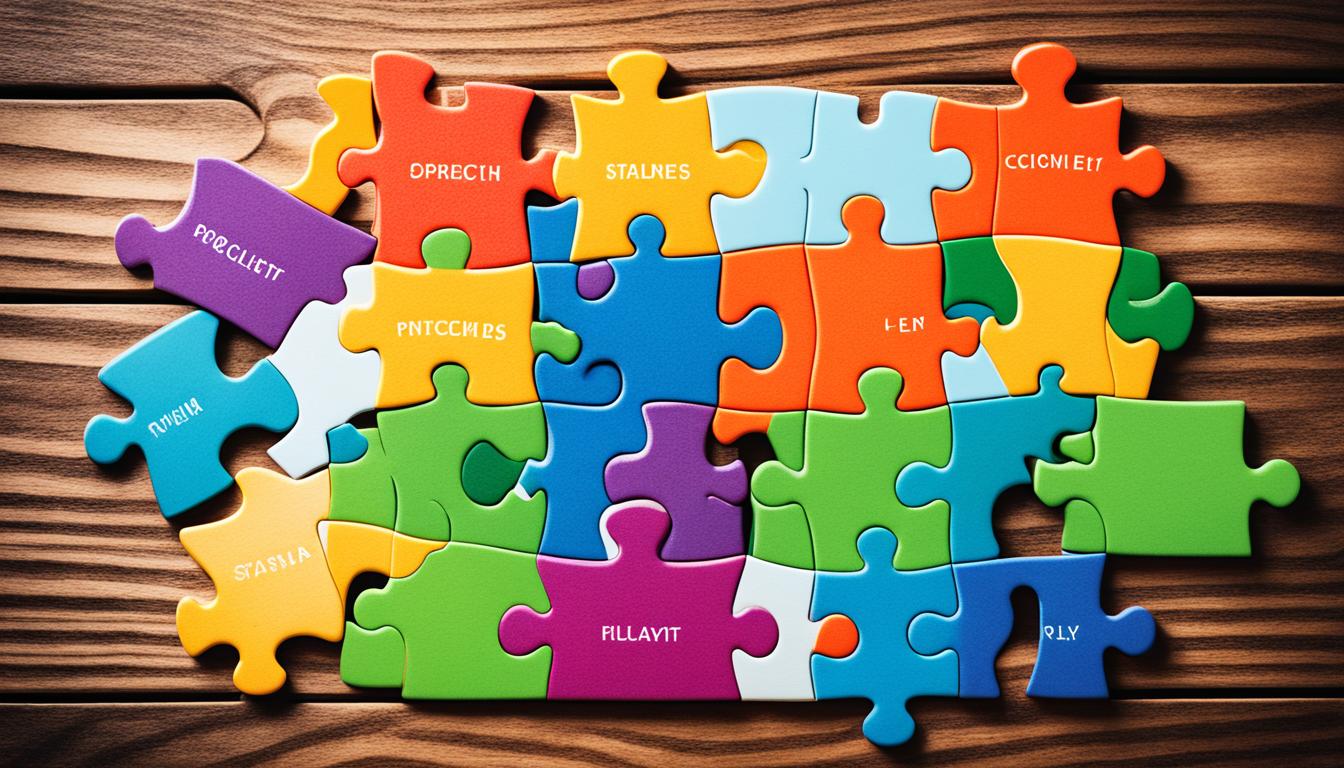Looking to boost sales and productivity in your company? Employee rewards and incentives can motivate your sales team. A good salary is important, but it’s not the only thing that matters.
Rewards and incentives are key for a successful sales culture. They keep sales staff motivated and loyal. This creates a competitive sales environment and supports everyone’s goals.
This article will show you how rewarding your employees can boost sales and productivity. We’ll talk about how rewards improve sales and share tips for making effective incentive programs. Plus, we’ll look at some Philippine SMEs that did this well, and the wider benefits of these programs.
We will also talk about why it’s vital to tailor rewards to different teams. And we’ll discuss how these incentives influence job satisfaction. Learn how motivation can unlock your team’s full sales potential. Plus, get insights on loyalty programs that can lead to long-term success.
Come along as we discover how employee rewards and incentives can grow your sales and boost productivity.
Key Takeaways:
- Employee rewards and incentives are crucial in boosting sales and driving productivity.
- Incentivizing sales staff can motivate them to achieve higher performance.
- Rewards and incentives promote retention, loyalty, and create a competitive sales environment.
- Aligning individual and organizational goals enhances sales effectiveness.
- Recognition programs go beyond boosting sales by improving employee motivation and contributing to a positive workplace culture.
The Role of Rewards and Incentives in Sales Performance
Companies today are always looking for ways to sell more and grow. They find success by using rewards and incentives. These programs help keep the sales team motivated, grow loyalty, create a competitive vibe, and connect personal goals to company targets.
Motivational Aspects of Incentivizing Sales Staff
The key to meeting and beating sales goals is keeping the team motivated. By offering rewards, companies inspire their sales team to do better. Bonuses, commission pay, and praise all help salespeople strive harder. Incentives push them to outdo their previous best.
Retention and Loyalty Through Rewards
Keeping your best salespeople is essential. Rewards and incentives make employees feel they belong and are valued. This encourages them to stick with the company. It also makes the workplace a positive space where sales staff feel appreciated.
Cultivating a Competitive Sales Environment
A little competition drives better sales. Incentive programs spark this by rewarding top salespeople. This motivates others to do better too. It leads to everyone working harder. It boosts not just individual but team efforts too.
Aligning Individual and Organizational Sales Goals
To sell well, everyone should aim for the same targets. Rewards connect an employee’s goal to the company’s mission. This alignment gives work a clear focus. It also makes teamwork stronger as everyone pulls for the same success.
| Rewards and Incentives in Sales Performance | Motivation | Retention and Loyalty | Competitive Sales Environment | Goal Alignment |
|---|---|---|---|---|
| Empowers sales staff to perform at their best | Motivates sales professionals to achieve targets | Fosters loyalty and reduces turnover | Cultivates healthy competition among sales teams | Aligns individual goals with organizational objectives |
| Recognizes and rewards exceptional sales performance | Encourages sales staff to exceed expectations | Creates a positive work environment | Drives sales growth and productivity | Fosters collaboration and teamwork |
| Builds a sense of appreciation and value | Increases employee satisfaction and engagement | Cultivates a motivated and loyal sales team | Fuels collective growth and success | Strengthens organizational cohesion |
Strategies for Implementing Effective Incentive Programs
Effective incentive programs make a big difference in sales, engagement, and productivity. They motivate salespeople to reach high goals. Here are some strategies you should think about when setting up these programs:
- Clearly Define Goals and Objectives: Establishing clear goals is vital. Employees should know exactly what they need to do to get rewards. This helps everyone work towards the same objectives.
- Tailor Incentives to Individual Needs: People find motivation in different things. Offer a variety of rewards to meet everyone’s unique desires. This can range from cash bonuses to unique experiences.
- Communicate Program Details Clearly: Be crystal clear about what the program is about. Make sure everyone knows the rules, the goals, and how they can earn rewards. Good communication is essential.
- Monitor and Evaluate Performance: Keep an eye on sales results and check if your program is working. Adjust it as you go to keep it effective. Using data to make these decisions is critical.
- Foster Healthy Competition: A bit of healthy competition can boost motivation and improve sales. Recognize the best performers and celebrate their successes. This motivates everyone to do better.
- Offer Non-Monetary Incentives: Besides money, think about offering other perks. These can be things like public recognition, chances for career growth, or more flexible work hours. Such benefits make employees happier.
Good incentive programs do more than reward sales. They build engagement, a positive workplace, and link personal and company aims. With these strategies, companies help their sales teams grow and succeed.
Recognition Programs: More Than Just a Sales Booster
In today’s business world, recognition programs are key. They help boost employee spirit, improve selling, and make a good workplace. While they’re known for helping sales, they do a lot more than just that.
These programs really lift employee’s spirits by appreciating their hard work. When people feel valued, they become happier at work. This happiness pushes them to do better, maybe even pass their sales goals. It also means they work harder to give top-notch results.
These programs boost how well a team sells by making it fun. Recognizing one person’s great work can motivate others to do their best, ultimately lifting the team’s sales. They also push for team-playing by encouraging everyone to share knowledge and solve problems together.
Recognition programs really change how the workplace feels. They make a space where everyone feels respected and valued. When employees are happy with where they work, they stay longer and do better. This makes the company stronger over time.
“Recognition is the greatest motivator.” – Gerard C. Eakedale
There are many ways to design these programs, fitting them to a company’s specific style. It could be giving out awards every month or having teams cheer each other on. The goal is to encourage good work by always celebrating what’s going right. Doing this can make a powerful, positive change in the workplace.
Personalizing Incentives for Diverse Sales Teams
Not everyone on a sales team will react the same to incentives. This is because each salesperson is different. They have their unique goals, what drives them, and their preferences. To really make incentive programs work, you need to personalize them for each team member.
Understanding Employee Preferences
To make incentives work, start by understanding each sales team member. Talk to them, use surveys, and gather feedback. This helps you learn what they’re interested in and what motivates them. Knowing their preferences helps you tailor your incentives to meet their specific needs.
Creating Individualized Reward Systems
After you know what your team likes and wants, create rewards just for them. Instead of the usual bonuses or gift cards, get creative. Think about giving them unique experiences or gifts related to their hobbies.
Personalizing incentives tells your team you value them as individuals. This approach boosts their motivation and keeps them engaged. It also helps build a stronger sales team culture. When your team feels understood and valued, they will work even harder to meet their goals.
Check out the visual guide below for a quick recap of the important points.
| Benefits of Personalizing Incentives | Strategies for Individualizing Rewards |
|---|---|
|
|
Customizing incentives helps you get the most from your diverse sales teams. Recognizing and celebrating what makes each team member unique boosts performance. It also creates a more open, welcoming, and high-achieving work environment.
The Psychological Impact of Incentive Solutions
Employee rewards go beyond money. They affect how employees see their work and themselves. This affects the sales culture and job satisfaction in big ways.
Building a Positive Sales Culture
Creating a good sales culture is key to growth and keeping employees driven. Incentive solutions help do this by making a place that values strong work. When employees know their hard work is seen and rewarded, they work even harder. This boosts sales and makes the team work better together.
These solutions also help sales teams work together better. They do this by promoting friendly competition and praising those who do well. This makes the team feel more like a team, pushing everyone to do better.
The Link Between Recognition and Job Satisfaction
Feeling recognized at work makes a big difference. It makes employees happy and loyal. Using incentives to show recognition can make salespeople enjoy their work more.
When salespeople are praised for their work, they get a confidence boost. This makes them like their job more? and want to do even better. Regular recognition helps keep this positive feeling going. It makes everyone want to keep up the good work.
By celebrating salespeople’s wins, companies become places where people enjoy working. This motivates and satisfies employees. It makes the workplace a positive space.
In the end, incentives do a lot more than we might think. They help shape a good sales culture. They also show employees their work is valued, making them enjoy and do better in their jobs.
Employee Motivation: Key to Unlocking Sales Potential
Employee motivation is key to making more sales. When your team is driven, they do better than expected. This makes achieving sales growth easier. We’ll look at ways to keep your sales team motivated. Plus, we’ll talk about how to check if these methods are working.
Engagement Techniques That Drive Results
Motivating your sales team is crucial. Consider these effective techniques:
- Open and Transparent Communication: Create a safe space for sharing ideas and issues. Have regular meetings and give feedback. This makes them feel included and valued.
- Recognition and Appreciation: Always praise your team’s work. This can be done through public shout-outs, highlighting employees, or giving rewards. It boosts their spirits.
- Continuous Learning and Development: Support their growth with training programs. This shows you care about their career progress.
- Goal Setting and Performance Tracking: Give clear goals and check their progress often. This makes success feel near and motivates them to achieve.
- Team Building Activities: Let your team bond through fun activities. This fosters a supportive and joyful work environment.
Evaluating the Effectiveness of Incentive Strategies
Checking if your incentives work is as important as offering them. Here’s how to understand if they’re making a difference:
- Tracking Sales Performance: Look at sales data to see if incentives boost sales. This tells you their direct effect.
- Employee Surveys and Feedback: Get feedback on the incentive systems from your team. Their thoughts can shed light on what needs to improve.
- Retention and Turnover Rates: See if incentives help keep your team. A good program keeps people happy and in their jobs.
- Cost-Benefit Analysis: Measure if the cost of incentives is worth the return. This helps decide if your investment is smart.
Checking your incentives’ impact is crucial. This allows you to tweak your approach for better results. With the right strategies, boosting your team is possible.
Now, let’s see how building loyalty can lead to long-term sales gains. Join us in the next part to learn more.
Designing Loyalty Programs for Lasting Sales Success
Loyalty programs are key for long-term sales wins. They boost customer loyalty and repeat sales, laying a path for steady growth. To make a loyalty program that works, businesses must focus on keeping customers happy and offering good reasons to stick around.
One smart move is to give special rewards to loyal customers. This could be through unique discounts, personalized offers, or special promotions. By doing this, companies can make their products more tempting than the competition’s. Having a system where loyal customers get better rewards as they move up a level makes them feel special.
Customizing rewards can really hook customers in. By adjusting rewards to match what each individual customer likes, they’re more likely to stay loyal. This means looking at what they’ve bought, what they like, and their background to tailor rewards that really speak to them.
Adding fun challenges and games to your loyalty program can also help. It makes the whole process more interesting, encouraging customers to get involved. Besides making it more fun to earn rewards, it can create a fun community where customers compete and relate to each other.
Making sure the loyalty program is easy to use is crucial. A simple mobile app or website can do wonders. This lets customers easily see their progress, use their rewards, and get suggestions tailored to them. It makes engagement smoother and more appealing.
Designing a successful loyalty program needs insight into what customers like, smart personalization, fun games, and easy access. By following these steps, businesses can craft a loyalty program that not only boosts sales, but also keeps customers coming back.
Incorporating Technology into Incentive Management
As the world of business changes, using technology is key in managing rewards well. Technology helps companies make their reward programs easier and more available for their sales teams.
Using Software to Streamline Rewards Programs
Software is essential for making rewards programs simple and automated. It lets companies keep track of their incentives easily. This includes checking employee progress, sales, and giving out rewards easily. Plus, these tools can give businesses important data and insights to make their programs better over time.
Mobile Applications That Enhance Accessibility of Incentives
Today, apps are changing how sales teams experience and use rewards. With these apps, salespeople can quickly see and use their rewards. They can check their rewards and even claim them outside the office. These apps update rewards in real-time, send reminders, and offer fun features. This makes the whole process more engaging for employees. With these apps, sales teams can keep up with their rewards wherever they go.
Conclusion
Employee rewards and incentives are key in boosting sales and work effectiveness. Businesses can use these strategies to motivate their sales teams. This article looked at how such rewards help with motivation and reaching goals.
Rewards and incentives create a competitive sales area. They connect personal and company targets. These perks keep salespeople excited, help keep them on board, and boost overall sales over time. By tailoring rewards and knowing what your sales team likes, you can make these plans work even better.
Acknowledging good work also enhances sales and work culture. Thanks to technology, managing rewards has become easier. This helps everyone access these benefits better.
In summary, using rewards and incentives in sales plans is vital for growth and success. Businesses should focus on keeping their teams motivated. This way, they can win in the fast-paced world of sales.





